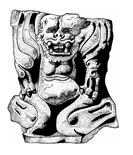
On the Tragical History of the Life and Death of Doctor Faustus. By Christopher Marlowe.
LITERATURE MATTERS
William Shakespeare is, without a doubt, the greatest of Elizabethan playwrights. And many scholars agree that Shakespeare is the most accomplished dramatist the world has ever known.
But before Shakespeare came onto the scene, Christopher Marlowe was the leading light of Elizabethan London. And, like Shakespeare, Marlowe was cloaked in mystery. In fact, he was the subject of a number of contradictory accusations during his short professional life: He was simultaneously accused of being an atheist and a Catholic, the latter a capital offense at times during the reign of Elizabeth Tudor. Marlowe was also accused of being a spy for Catholics even as he was accused of infiltrating the Catholic community as a spy for the queen. All we really know is that he left the University of Cambridge under a cloud of suspicion and died of a knife wound a few years later in a pub brawl at the hands of men known to work for the queen. His untimely death came at the age of 29.
That didn’t leave Marlowe much time to share his literary genius with the world. He wrote just five plays. His most enduring work is The Tragical History of the Life and Death of Doctor Faustus.
Set in early 16th-century Wittenberg, Germany, home to Martin Luther’s Protestant revolt, the play is based on the bizarre, legendary accounts of occultist Johannes Faustus. Marlowe’s Faustus is a prideful professor whose moral judgment and rational intellect become clouded by his desire to, essentially, be like God. But instead of imitating Christ, Faustus rejects logic, medicine, law, philosophy, and theology — every branch of medieval learning — as “odious and obscure” and meant only for “petty wits.”
Searching for knowledge more profound, he enlists the aid of Cornelius and Valdes, two well-known astrologers, to initiate him into the dark arts. Faustus’s life as a necromancer begins by racking the name of Christ, abjuring the Scriptures, and conjuring Mephistophilis, a helper of the Devil he finds so hideous that he asks him to go back to Hell and return in the form of an elderly Franciscan friar — the form, Faustus says, that suits a demon best.
You May Also Enjoy
Holy Mother Church must generate tough guys, strong fathers specialized in spiritual warfare, to defend us in battle against the wiles and snares of the Devil.
If we continue to cede our lives to Hollywood and tech, we will fall prey to consumerism and become a vacuous people concerned with little more than our own amusements.
Our rewriting of the great drama of life, which should proceed like a mysterious tale full of wonder and engagement, is a sad soliloquy.

